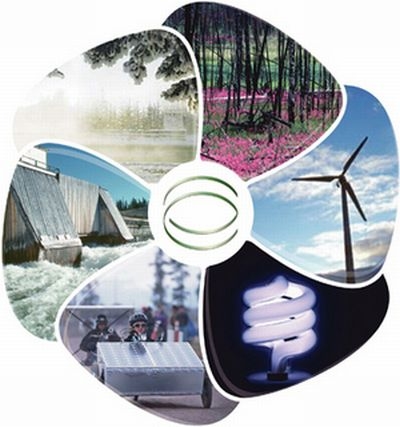Why Africa Should Go Green

 |
| Green energy sources Photo courtesy |
Six main principles are at stake here: Pollution reduction, natural resources conservation, energy conservation, adhering to the tenets of the Kyoto Protocol, striking a balance in the ecosystem and a reduction in consumption and waste. There are socio-economic implications if African Countries and the World at large do not contribute their quota in stemming the reckless spewing of Green House Gases (GHG) into the atmosphere. What should countries in Africa do to help avert this looming disaster?
Plants and Animals: Since Africa has so much organic matter that is capable of producing biomass- a renewable source of Energy, why can’t African governments allot a portion of their GDP annually towards the production of biomass and other renewable sources, instead of relying on the usage of charcoal burning which is harmful to the environment due to the felling of trees and subsequent reduction of the forest cover? A case in point: corn ferments to form ethanol, a fuel component that can run vehicles and machinery. The good news is that it is almost a carbon neutral liquid fuel. If this is implemented, it will be a win-win situation in Africa - a bold step to arresting this looming menace. Developed countries are expected to contribute their quota for a stabilized ecosystem. What about biodiesel which can be processed from cooking grease or vegetable oil? Besides, this is a product which is not only green but could reduce the dependence on global oil cartels by poor countries in Africa. Biodiesel can run automobiles and machinery!
Wind: While windmills have been around for several years, they have not made any major impact in Africa until recently. Today larger and more powerful wind turbines have been instrumental in alleviating the growing energy requirements of countries like Mexico, the Philippines, Egypt, Argentina, South Africa, the United States, the Netherlands and Morocco. The good news is that this power source is environmentally friendly and while it cannot be used everywhere, places in Africa such as the African coastline where there are plentiful winds could be suitable places for wind energy production. It should be noted that wind energy can be generated inland where winds abound in Africa.
Water: Hydroelectric schemes abound in Africa and in the past they had been the mainstay of African countries. Its importance has been overshadowed by recent droughts in Africa. Simply put, dropping or falling water creates or generates cheap electricity. By constructing a dam across a fast flowing river, power is easily generated. What African countries can do to help boost and sustain energy (regardless of whether there is drought or not) is to have a consolidated power scheme that encompasses a combination of minor hydro projects and other renewable energy sources like biomass, geothermal and wind which do not require the presence of water as a prerequisite for electricity power generation.
The Earth: As one moves deeper into the earth crust, there is an increase in temperature resulting in the earth producing hot steam that is capable of producing electricity when efficiently tapped. This is called geothermal electricity. Kenya is in the process of harnessing geothermal energy. While this type of energy is both environmentally friendly, it is relatively cheaper and abundant in Africa as a resource. Every African country has access to the earth core which can be exploited for the sake of manufacturing (Value addition) and export diversification which are the key to jumpstarting the economies of African countries and stemming the increase in the widening economic gap between rich countries and poor countries in Africa. Why can’t governments in Africa take note and spend money wisely on projects like renewable energy sources which in return will bring value and economic windfalls to mother Africa?
The Sun: Africa has abundant direct sunshine throughout the year and stands to gain by tapping this plentiful resource. Simply put, solar energy can be obtained from panels which are capable of producing a combination of electricity and heat. It could boost the depleting energy supply in Africa in the wake of an increase in the high demand for manufacturing and the value addition industries and the occurrences of drought on the African continent which consequently is rendering hydro projects ineffective. There is a downside pertaining to this potential power source. Daylight limits the usage of this energy. However, with the purchase of specialized batteries, energy can be transferred and stored in such batteries which can be used at night time. Using solar panels does not impact the environment negatively. However, producing photovoltaic cells imply the usage of toxic chemicals that could harm the environment.
Kyoto Protocol: 14 September 2005
Officially, the Kyoto Protocol to the United Nations Framework Convention on Climate Change (UNFCCC) -- is an international treaty dealing with greenhouse gas emissions and global warming. The treaty was negotiated in Kyoto, Japan and adopted on 11 December 1997.
Readers in Africa should be aware that those countries in Africa that signed this protocol on 15 February 2005 are bound by law to observe the tenets enshrined in the agreement (http://uspolitics.about.com/) Generally speaking, the protocol seeks to drastically reduce/stem the harmful release of Green House Gases (GHG) into the atmosphere.
For a more detailed account on renewable power sources and their economic implications on Africa please check the following links: https://wwwbionomicfuel.com.createspace.com/3753615
http://www.amazon.com/dp/1475155298
By Emmanuel Botchwey
ebotc@netzero.net
